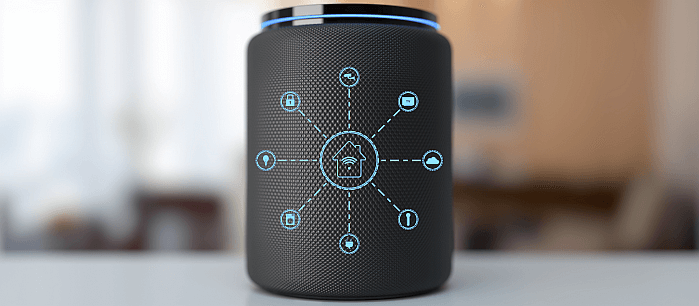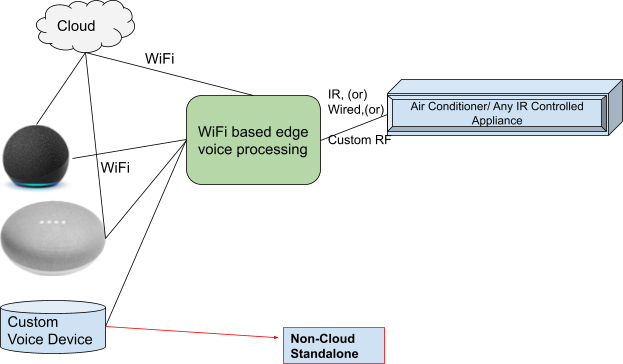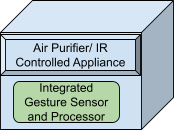Our Musings
Over 15 years, we have worked with customers across diverse domains.
Home Appliance - Non-touch control

February 28, 2022
Existing home-appliances are controlled either by on-device switches or physical remote control. These are based on physical contact/touch. The pandemic situations being witnessed today need no-contact solutions for the foreseeable future. This document identifies the approaches along with their key considerations for selecting a suitable non-touch control mechanism.
Approaches
1. Voice Control: This is a much implemented feature and is usually integrated with Alexa or Google Assistant. It is possible to build voice control systems without Alexa or Google Assistant, but the flexibility and unit cost to customers have to be understood before proceeding ahead.
2. Gesture Control: Gesture control is again a mature technology, its versatility was first popularized with Microsoft Kinect. Today gestu/re control has advanced with a variety available from simple IR transceiver to IR camera and full Image recognition based systems.
Key Considerations
The key parameters that determine the preferred mode of control are as listed below:
1. Reliability of control
- What is the recognition score? how many times in a 1000 natural interactions does the system fail: incorrectly detect, fail to detect
2. Cloud Connectivity Requirement
- Can the system work without cloud connectivity or with intermittent connectivity?
3. Quality of User Experience(UX)
-
How usable is the system by seniors(elderly) and people with disabilities: stammer, disability of hands, stutter, shiver and shake of hands?
-
How difficult or easy is it to set up or reconfigure the system?
-
Does the remote talk-back, does it provide 2-way interaction?
-
Does the system perform reliability in all environment conditions(light, noise etc)?
4. Fallback remote control options
-
What happens if the Alexa or Google Assistant device is non-functional?
-
What happens if the gesture detection device is lost?
-
What is the fall-back for seniors(elderly) and people with disabilities?
5. Manufacturing Cost of the mechanism
-
Remote controls are very low-cost and also have a significant after-sales market. Typical entry-level AC remotes retail from INR 130 onwards.
-
It has to be understood that Voice or Gesture support makes the product premium, typical retail cost of Alexa controlled Air Conditioners is round INR 40,000 vs INR 29,000 for no-Alexa Air Conditioner
6. Updates & Upgrades
-
Hassle free firmware updates is a key requirement for modern connected devices, these are required for the following key reasons:
-
Feature updates
-
Bug fixes
-
Security updates
7. Safety
- Does the remote detect abuse or misuse(by playful children for e.g) and protect the equipment ?
8. Security
-
Is the system accessible from the internet?
-
Does the compromise of the server or anonymous access to the device leak sensitive data?
-
How is the device audited and tested for security?
Suggestive Block Diagram
Voice Control

Gesture Control


Implementation Options
The following implementation options exist:
1. Internal Integration
Voice Control: This is possible for voice remote controls, wherein the Wifi module with command processing is integrated into the appliance. In appliances such as air-conditioners this is installed in the In-Door Unit( IDU) itself.
Gesture Control: This can be integrated into a window air conditioner or an air-purifier directly on the Printed Circuit Board Assembly(PCBA). However, this is not feasible in a reliable fashion for systems such as split air-conditioners due to distance from the user.
2. External Integration
Voice Control: External Integration involves a WiFi to IR adapter(WIA) or a Voice to IR Adapter(VIA). This approach allows even legacy air-conditioners to be voice enabled. Another advantage being the IR remote is a fallback and no modifications are required for the IDU. The VIA usesa a stand-alone voice processor and does not depend on Google Assistant or Alexa. The WIA or VIA could be mounted on a switchboard or separately powered by a 5V Wall Adapter supply.
Gesture Control: External Integration involves a Gesture to IR adapter(GIA). This approach allows even legacy air-conditioners to be voice enabled. Another advantage being the IR remote is a fallback and no modifications are required for the IDU. The GIA could be mounted on a switchboard or separately powered by a 5V Wall Adapter supply.
Thotaka - Solution enabler:
-
Thotaka Tekhnologies provides concept to manufacturing services including certification and qualification as a one-stop provider
-
Thotaka Tekhnologies has prior experience in realizing the technologies mentioned here-in and can thus accelerate the product development
-
Thotaka Tekhnologies has a dedicated IR decode and debug facility that enables engineering the IR Remote work-flows even when the AC Remote ODM is un-willing to share the IR codes and work-flow.
Talk to us
Thotaka Tekhnologies India Pvt Ltd.
#36-46/2, Plot No 486,
Defence colony, Sainikpuri,
Secunderabad -500094,
Telangana-India
Thotaka Tekhnologies India Pvt Ltd.
#36-46/2, Plot No 486,
Defence colony, Sainikpuri,
Secunderabad -500094,
Telangana-India
© Copyright - Thotaka Tekhnologies India Pvt Ltd. All rights reserved.

